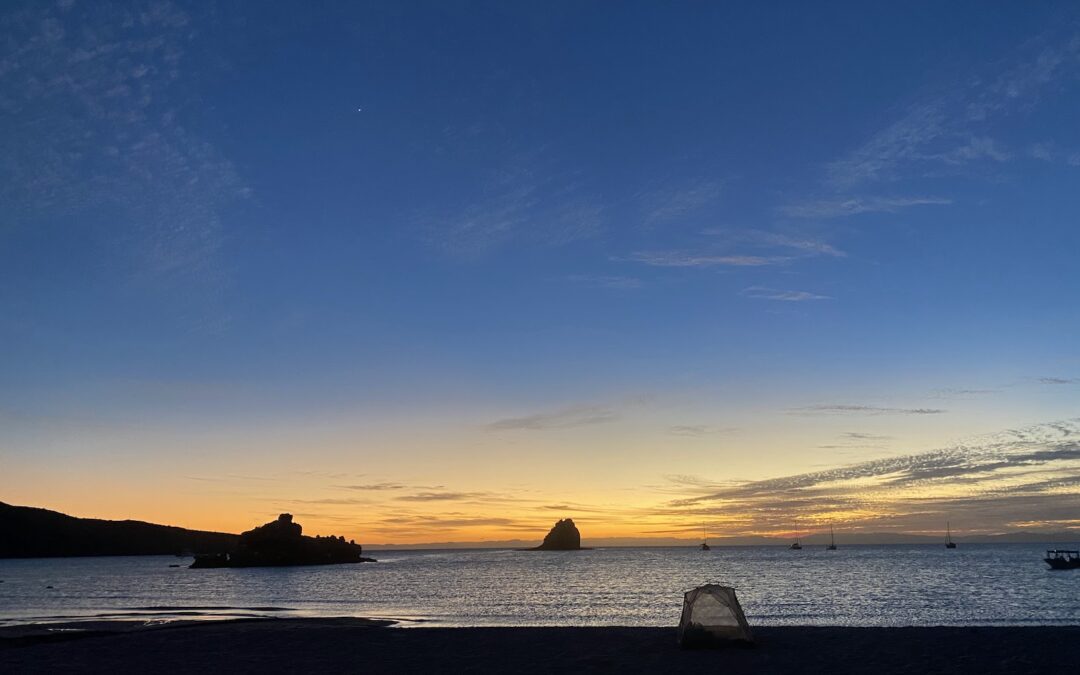By: Itzbeth Menjívar, Social Entrepreneur & Unsettled Sailing: Alum
Header photo by Itzbeth Menjívar
I recently had the wonderful opportunity of joining a week-long sailing retreat in the Exuma Islands of the Bahamas with an organization called Unsettled, described on their website as “a global community for those who embrace uncertainty and value meaningful human connection. Who believe that feeling a little bit “unsettled” is a positive impulse for change, innovation, and discovery in our lives.”
I have certainly been unsettled, for some years now, by the realization of just how exclusion, discrimination, and dehumanization are so solidly baked into our economic, political, educational, professional, and religious structures. And similar to Unsettled, I hold the view that meaningful human connection is what is often missing. I approach my work to advance race and gender equity from the perspective that healthy relationships could be the most powerful antidote to systems of oppression and exploitation.
This was my first time sailing for more than a day, and as not just a passenger but also part of the crew of nine, I was exposed to a number of lessons that I find useful for anyone working to create a more just and equitable world. The lessons contained within living in very close proximity with eight people, most of whom I had not met before, were many, but there are three in particular that are worth highlighting:
It is important to know your maximum cruising speed. The first thing I noticed when I stepped into the catamaran that would be our home for a week was a sign under the helm that warned to the vessel’s maximum cruising speed. While the words ‘cruising’ and ‘speed’ may seem to be antonyms, they reflect well the balance that is needed to create change in the world. While we need a sense of urgency about dismantling systems of oppression, we also must realize that these systems have been in place since the beginning of time, and chances are that we will not solve them in our lifetime. One of my elders told me once that the fight for racial justice is not a marathon, it is a relay race. By understanding the right balance of work versus rest or play, we are better placed to slow down when needed to ensure we are not leaving anyone behind, and to truly be present to one another’s needs and humanity. In many ways, our economic systems require that we equate our value with what we produce, causing the burnout resulting from creating a false sense of urgency, often resulting in a sense of disorientation whenever we are not attached to a particular job or task. I was surprised when I encountered some who were very worried about what may be happening with their work back home whenever we were outside of cell phone service, but then I realized that I have also personally struggled with reminding myself that as a human being my value is inherent, and that what I produce is my contribution to society, but not a measure of my value as a person. Having developed a practice of mindfulness has been extremely helpful in helping me see the need to slow down and sometimes even completely unplug, in order to be more effective in the long-term. This slowing down or unplugging does not always mean that we will arrive later, sometimes it actually propels us faster towards our destination, by harnessing the winds of connection and relationship.
Shared language and communication are key. The first lesson onboard our catamaran was creating shared language. Entering a new environment often requires learning a new language, in order to be effective. Understanding terms like helm, starboard, port, bow, and stern was key for me to be a productive crew member. (My favorite mnemonic device was provided by our Captain’s mom: port, left, and f%ck are all four-letter words, ha!) The same applies to work that advances justice. When I start working with clients interested in transforming their organizational culture to one that is inclusive and equitable, I always start with shared language. There are many different understandings and ways of using different terms like discrimination, diversity, inclusion, white privilege, white exceptionalism, white silence, tone policing, tokenism, etc. By creating agreement within teams of how these terms will be used, we create opportunities for dialogue and understanding one another. As someone who aced the math portion of the SATs but struggled with the language portions more than twenty years ago, I can now understand how testing inner city kids on language used by those with the privilege to sail on a regular basis was profoundly unfair, and is but one example of how deeply embedded exclusion can be. Related also to exclusion is when leaders want to protect their vision of what is possible, at the expense of what the team needs or wants, rather than facilitating a process that brings out the brilliance of their team. On one occasion when we met with the second boat on our trip, one of the leaders seemed upset and unwelcoming of our arrival to their boat and I was the first one to receive that communication, as the first one off the dinghy. As the only person who identified as a black woman in the group, my initial feeling was one of being excluded because of my race. I could have just gone on thinking poorly of this leader and assigned nefarious racial motivations to his reaction, but instead I observed him for a few moments, and noticed that more than controlling, he was really an introvert trying to preserve a certain dynamic within his crew. This inspired me to reach out to him and ask about how was he doing and inquire as to his mindset at that time. The resulting conversation gave us the opportunity to get to know each other more deeply, restore harmony, and allowed him, without my nudging, to offer an apology for that moment of what felt like exclusion to me, but may have just been a moment of wanting to protect a special moment with his crew. I believe many of us who are natural-born leaders have been guilty at some point of these two mistakes: jealously protecting those who do not need or want protection, and also assuming the worst in others, rather than seeking to clarify. Assuming what is going on with someone else does not usually lead to connection and dialogue, but rather to separation, demonization, and dehumanization. As leaders interested in meaningful human connection, we have a responsibility to foster dialogue and seek shared understandings. George Bernard Shaw rightly once said: “The single biggest problem in communication is the illusion that it has taken place.”
Just because you cannot see the bruises, it does not mean they don’t exist. Living in tight quarters inside of a vessel that is floating on water provides many opportunities for bruising. The bruises of many of my fellow white crew members were much more visible than mine because of my darker skin, and therefore all the conversations regarding the bruises were limited to those that were visible. It took almost two weeks for my invisible but very painful bruises to heal. This was a reminder to me that everyone walks around with bruises, challenges, pain, and trauma that are very real, even when they may not be visible. One of the factors that fuel discrimination and exclusion is our society’s unwillingness to look past what is on the surface. We look at communities that are living in poverty and judge their inability to lift themselves out of poverty as a result of personal failure, rather than a result of historic and systematic exclusion and discrimination. We refuse to look at the inter-generational trauma resulting from genocide, slavery, black codes, Jim Crow, mass incarceration, and other forms of white violence against communities of color. Often what ends up happening is that trauma passes as culture, resulting in the determination by those who are not part of those communities that their culture is somehow inferior, lazy, or unwilling to progress, ignoring the effects of traumatic state-sponsored violence and discrimination inflicted on communities of color for generations. We have all been guilty of this, not only white wealthy communities. Those of us who have voluntarily immigrated to the United States are told by our society that our African American counterparts have not excelled due to some type of cultural failure, without providing context and light to the fact that African Americans who descended from kidnapped and enslaved Africans did not come to this country voluntarily, did not gain the full rights of citizenship until the Civil Rights Act less than sixty years ago, have been systematically excluded from wealth creation opportunities provided to white citizens (such as home ownership) and that many still struggle to fully realize the rights of citizenship. Similarly, Native American communities, whose lands were stolen to profit solely white male citizens, and whose traditions and languages were forbidden by our government until recently, do not enjoy the freedom and independence afforded to the European settlers who occupy their lands. It is easy to look at what’s on the surface and judge unfairly. In order to realize the promise of the American Dream for all its citizens, we each must be willing to re-humanize one another, look deeper than the surface, and be willing to build and nourish relationships outside our comfort zones.
Leaders looking to achieve great things with diverse teams need cultural competencies that bring light to the blind spots that perpetuate inequality and exclusion. If you are a leader ready to expand your impact by deepening relationships and creating inclusive environments, I would be delighted to be a part of your crew. The BridgePeople network works with small and large organizations, in the corporate, government, and non-profit sectors, in the United States and around the world, and we have capacity to facilitate customized dialogue, learning, and retreats in many languages and cultures. I look forward to connecting with you!
Fair winds,
Itzbeth
—
This article was originally published on LinkedIn.
Unsettled is a global community for those who live and work differently.
Growth | Meaning | Adventure



